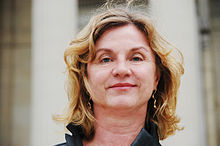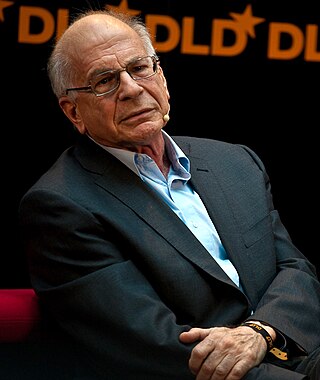
Daniel Kahneman was an Israeli-American author, psychologist, and economist notable for his work on hedonism, the psychology of judgment, and decision-making. He is also known for his work in behavioral economics, for which he was awarded the 2002 Nobel Memorial Prize in Economic Sciences shared with Vernon L. Smith. Kahneman's published empirical findings challenge the assumption of human rationality prevailing in modern economic theory. Kahneman became known as the "grandfather of behavioral economics."

Paul Slovic is a professor of psychology at the University of Oregon and the president of Decision Research. Decision Research is a collection of scientists from all over the nation and in other countries that study decision-making in times when risks are involved. He was also the president for the Society of Risk Analysis until 1984. He earned his undergraduate degree at Stanford University in 1959 and his PhD in psychology at the University of Michigan in 1964 and has received honorary doctorates from the Stockholm School of Economics and the University of East Anglia. He is past president of the Society for Risk Analysis and in 1991 received its Distinguished Contribution Award. In 1993, he received the Distinguished Scientific Contribution Award from the American Psychological Association, and in 1995 he received the Outstanding Contribution to Science Award from the Oregon Academy of Science. In 2016 he was elected to the National Academy of Sciences.

Gerd Gigerenzer is a German psychologist who has studied the use of bounded rationality and heuristics in decision making. Gigerenzer is director emeritus of the Center for Adaptive Behavior and Cognition (ABC) at the Max Planck Institute for Human Development and director of the Harding Center for Risk Literacy, both in Berlin.
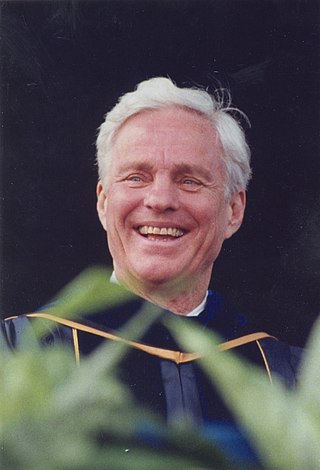
Richard Chatham Atkinson is an American professor of psychology and cognitive science and an academic administrator. He is president emeritus of the University of California system, former chancellor of the University of California, San Diego, and former director of the National Science Foundation.
The Department of Social and Decision Sciences (SDS) is an interdisciplinary academic department within the Dietrich College of Humanities and Social Sciences at Carnegie Mellon University. The Department of Social and Decision Sciences is headquartered in Porter Hall in Pittsburgh, Pennsylvania and is led by Department Head Gretchen Chapman. SDS has a world-class reputation for research and education programs in decision-making in public policy, economics, management, and the behavioral social sciences.
The Earth Institute is a research institute at Columbia University created in 1995 for addressing complex issues facing the planet and its inhabitants, with a focus on sustainable development. With an interdisciplinary approach, this includes research in climate change, geology, global health, economics, management, agriculture, ecosystems, urbanization, energy, hazards, and water. The Earth Institute's activities are guided by the idea that science and technological tools that already exist could be applied to greatly improve conditions for the world's poor, while preserving the natural systems that support life on Earth.

Jean Tirole is a French economist who is currently a professor of economics at Toulouse 1 Capitole University. He focuses on industrial organization, game theory, banking and finance, and psychology. In particular, he focuses on the regulation of economic activity in a way that does not hinder innovation while maintaining fair rules.
The Institute for Social and Economic Research and Policy (ISERP) is the research arm of the social sciences at Columbia University, formerly known as the Paul F. Lazarsfeld Center for the Social Sciences. ISERP works to produce pioneering social science research and to shape public policy by integrating knowledge and methods across the social scientific disciplines. ISERP organizes an active intellectual community at Columbia University through its Faculty Fellows program, research centers, projects, and training initiatives.

The Princeton University Department of Psychology, located in Peretsman-Scully Hall, is an academic department of Princeton University in Princeton, New Jersey. For over a century, the department has been one of the most notable psychology departments in the country. It has been home to psychologists who have made well-known scientific discoveries in the fields of psychology and neuroscience.
Jennifer S. Lerner is an American experimental social psychologist known for her research in emotion and decision theory. She is the first psychologist at the Harvard Kennedy School to receive tenure. At Harvard, her titles include Professor of Public Policy and Management, Professor of Psychology, Faculty Director in the Graduate Commons Program, co-founder of the Harvard Decision Science Laboratory and co-director of the Harvard Faculty Group on Emotion, Decision Making, and Health. Her research interests include the effects of accountability on judgment and choice. She founded and directs the Leadership Decision Making program within Harvard Kennedy School's executive education program.

Eldar Shafir is an American behavioral scientist, and the co-author of Scarcity: Why Having Too Little Means So Much. He is the Class of 1987 Professor in Behavioral Science and Public Policy; Professor of Psychology and Public Affairs at Princeton University Department of Psychology and the Princeton School of Public and International Affairs, and Inaugural Director of Princeton’s Kahneman-Treisman Center for Behavioral Science and Public Policy.
Eric J. Johnson is a professor of marketing at Columbia University where he is the inaugural holder of the Norman Eig Chair of Business. He is the Co-Director for the Center for Decision Sciences.
Graham Loomes, is a British economist and academic, specialising in behavioural economics. Since 2009, he has been Professor of Economics and Behavioural Science at the University of Warwick. He previously worked at the University of Newcastle, the University of York and the University of East Anglia.
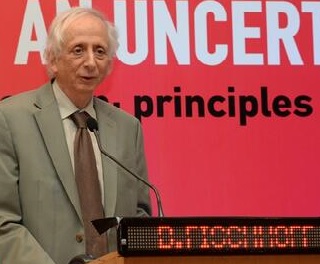
Baruch Fischhoff is an American academic who is the Howard Heinz University Professor in the Institute for Strategy and Technology and the Department of Engineering and Public Policy at Carnegie Mellon University. He is an elected member of the (US) National Academy of Sciences and National Academy of Medicine. His research focuses on judgment and decision making, including risk perception and risk Analysis. He has numerous academic books and articles. Fischhoff completed his graduate education at the Hebrew University of Jerusalem under the supervision of Daniel Kahneman and Amos Tversky.

Sander L. van der Linden is a Dutch social psychologist and author who is a professor of social psychology at the University of Cambridge. He studies the psychology of social influence, risk, human judgment, and decision-making. He is particularly known for his research on the psychology of social issues, such as fake news, COVID-19, and climate change.

Shahzeen Attari is a professor at the O'Neill School of Public and Environmental Affairs at Indiana University Bloomington. She studies how and why people make the judgements and decisions they do with regards to resource use and how to motivate climate action. In 2018, Attari was selected as an Andrew Carnegie Fellow in recognition of her work addressing climate change. She was also a fellow at the Center for Advanced Study in the Behavioral Sciences (CASBS) from 2017 to 2018, and received a Bellagio Writing Fellowship in 2022.
Talya Miron-Shatz is an Israeli researcher who specializes in medical decision-making. She is a full professor at the Ono Academic College, a senior fellow at the Center for Medicine in the Public Interest, New York, and a visiting researcher at the Wonton Centre for Risk and Evidence Communication, Cambridge University. She has worked as a consultant in the healthcare industry to companies from health advertising, digital health, wellness, and the pharmaceutical industry.

Ellen Peters is an American academic and the Philip H. Knight Chair, Director of the Center for Science Communication Research, and Professor both in the School of Journalism and Communication and in Psychology at the University of Oregon. She is also an associate in the Phil and Penny Knight Campus for Accelerating Scientific Impact. Prior to moving to the University of Oregon in 2019, she spent nine years in the psychology department at The Ohio State University where she was a Distinguished Professor. She also directed the Decision Sciences Collaborative in the College of Arts and Science and was a full member of the Cancer Control Center in Ohio State's Medical Center.
Keren Yarhi-Milo is an American political scientist specializing in the study of interstate communication, crisis bargaining, reputation and credibility, and the psychology of leaders and decision makers. She is the dean of the School of International and Public Affairs, Columbia University and the Adlai E. Stevenson Professor of International Relations at Columbia University. She is also a former director of the Arnold A. Saltzman Institute of War and Peace Studies at Columbia.
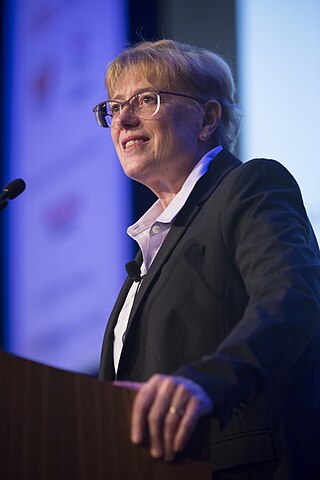
Ann Bostrom is an American policy analyst who is the Weyerhaeuser Endowed Professor in Environmental Policy at the University of Washington. Her research considers risk perception and management during uncertain times. She is a Fellow of the American Association for the Advancement of Science.
